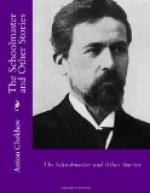Here in the bedroom reigned a dead silence. Everything to the smallest detail was eloquent of the storm that had been passed through, of exhaustion, and everything was at rest. A candle standing among a crowd of bottles, boxes, and pots on a stool and a big lamp on the chest of drawers threw a brilliant light over all the room. On the bed under the window lay a boy with open eyes and a look of wonder on his face. He did not move, but his open eyes seemed every moment growing darker and sinking further into his head. The mother was kneeling by the bed with her arms on his body and her head hidden in the bedclothes. Like the child, she did not stir; but what throbbing life was suggested in the curves of her body and in her arms! She leaned against the bed with all her being, pressing against it greedily with all her might, as though she were afraid of disturbing the peaceful and comfortable attitude she had found at last for her exhausted body. The bedclothes, the rags and bowls, the splashes of water on the floor, the little paint-brushes and spoons thrown down here and there, the white bottle of lime water, the very air, heavy and stifling—were all hushed and seemed plunged in repose.
The doctor stopped close to his wife, thrust his hands in his trouser pockets, and slanting his head on one side fixed his eyes on his son. His face bore an expression of indifference, and only from the drops that glittered on his beard it could be seen that he had just been crying.
That repellent horror which is thought of when we speak of death was absent from the room. In the numbness of everything, in the mother’s attitude, in the indifference on the doctor’s face there was something that attracted and touched the heart, that subtle, almost elusive beauty of human sorrow which men will not for a long time learn to understand and describe, and which it seems only music can convey. There was a feeling of beauty, too, in the austere stillness. Kirilov and his wife were silent and not weeping, as though besides the bitterness of their loss they were conscious, too, of all the tragedy of their position; just as once their youth had passed away, so now together with this boy their right to have children had gone for ever to all eternity! The doctor was forty-four, his hair was grey and he looked like an old man; his faded and invalid wife was thirty-five. Andrey was not merely the only child, but also the last child.
In contrast to his wife the doctor belonged to the class of people who at times of spiritual suffering feel a craving for movement. After standing for five minutes by his wife, he walked, raising his right foot high, from the bedroom into a little room which was half filled up by a big sofa; from there he went into the kitchen. After wandering by the stove and the cook’s bed he bent down and went by a little door into the passage.
There he saw again the white scarf and the white face.




